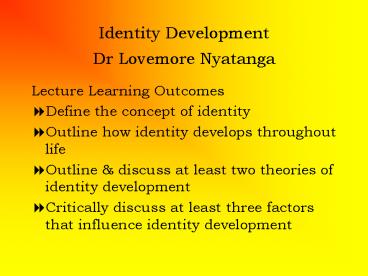Identity Development Dr Lovemore Nyatanga - PowerPoint PPT Presentation
1 / 15
Title:
Identity Development Dr Lovemore Nyatanga
Description:
Outline how identity develops throughout life ... Rapprochement: Compromise between autonomy & dependence (challenge and conciliatory behaviour) ... – PowerPoint PPT presentation
Number of Views:171
Avg rating:3.0/5.0
Title: Identity Development Dr Lovemore Nyatanga
1
Identity Development Dr Lovemore Nyatanga
- Lecture Learning Outcomes
- Define the concept of identity
- Outline how identity develops throughout life
- Outline discuss at least two theories of
identity development - Critically discuss at least three factors that
influence identity development
2
What is identity
- Individuality of the person.
- The personhood
- Relatively permanent traits shown in given
situations (e.g in role identity mother)
3
Personal Identity
- Construction of self through self knowledge
- Infants start without sense of self (Freud
Piaget) - Freudian symbiotic existence
- Piagetian object permanence
- Lewiss existential categorical self
4
Identity development
- The process by which each person becomes the
individual that he or she is. - The conditions and explanations of the self as
determined by biological psychological factors
5
Ethnic identity Development
- The ability to identify ones own and others
racial or ethnic group - Awareness of the permanence of ethnic identities
- Beliefs and values associated with ethnic
identity
6
Identity studies
- Verna (1981) Social Distance Scale
- Pre-School Racial attitude Measure (PRAM)
7
Identity development in adolescence
- Erik Eriksons major task of adolescence was
constructed as identity v. identity diffusion
(Who am I uniquely?) - James Marcias theory documented stages
proceeding on a continuum from foreclosure, to
diffusion, to moratorium to identity
achievement. - Jane Loevingers theory of personality outlines
the gradual internalization of external controls
and the maturing conscience for the guidance of
identity decisions.
8
Individuality Identity Theory Josselson
- Individuation theory (Josselson 1980)
- The individuation theory suggests four related
phases - Differentiation Teenage recognition of
separateness of own views, cultural parental
views. - Practice experimentation (14-15yrs) Tendency
to deny need for caution (I know what I am
doing). - Rapprochement Compromise between autonomy
dependence (challenge and conciliatory behaviour) - Consolidation of self Crystallisation of sense
of self-identity, autonomy, and interdependence.
9
Ruthellen Josselson
- Parental fears of losing control influence
sometimes fuels the identity crisis - Individuation continues throughout adolescence
10
Eriksons Theory
- Erikson (1963) emphasised the role of
psycho-social moratorium (sometimes- identity
crisis) - Adolescent may show (cognitive dissonance)
moratorium regarding social roles, values,
commitment - Moratorium involves experimentation (e.g
adventure travels, trying different jobs
academia - Moratorium often leads to identity achievement
commitment to social responsibilities. - Better preparedness for the next stage (intimacy
vs isolation)
11
Outcome of Eriksons Identity Theory
- The theory focuses on the 5th stage of Eriksons
epigenetic theory of development (identity Vs
role confusion) - Identity is positive outcome Role confusion is
a negative outcome - Role confusion is associated with delinquent and
anti-social behaviour as well as infidelity or
the inability to sustain loyalties and intimate
relationships.
12
Role Confusion/Diffusion
- Denotes the failure to achieve a relatively
coherent and integrated sense of self - Characteristics of role diffusion include
- avoidance of close relationships (unable to
sustain intimate relationships). Often there is
fear of being hurt or rejected. Sometimes reduced
tolerance. - diffusion of time perspective (out of step)
- diffusion of industry (unable to hold down a job)
- negative identity (moving against people)
13
Marcias Research on Identity Status
- Based research on Eriksons theory
- Marcia interviewed students (18-22 years old)
- Standard questions (occupation, religion,
politics, personal values - His pattern coding revealed 4 categories as shown
in next table - Meaning of each of the 4 categories (see next
slide)
14
Identity Status Marcia (1967 1980)
15
Recommended reading
- Seifert, Hoffnung Hoffnung (2001) Lifespan
development (Chapter 11). This chapter discusses
Josselsons theory, Erikson Marcias theories. - Bee, H. (1998) Lifespan development (Chapter 6)
- Ruthellen Josselson http//wupa.wustl.edu/asmbly/
bio/Josselson.html - http//www.as.huji.ac.il/ruth.html































